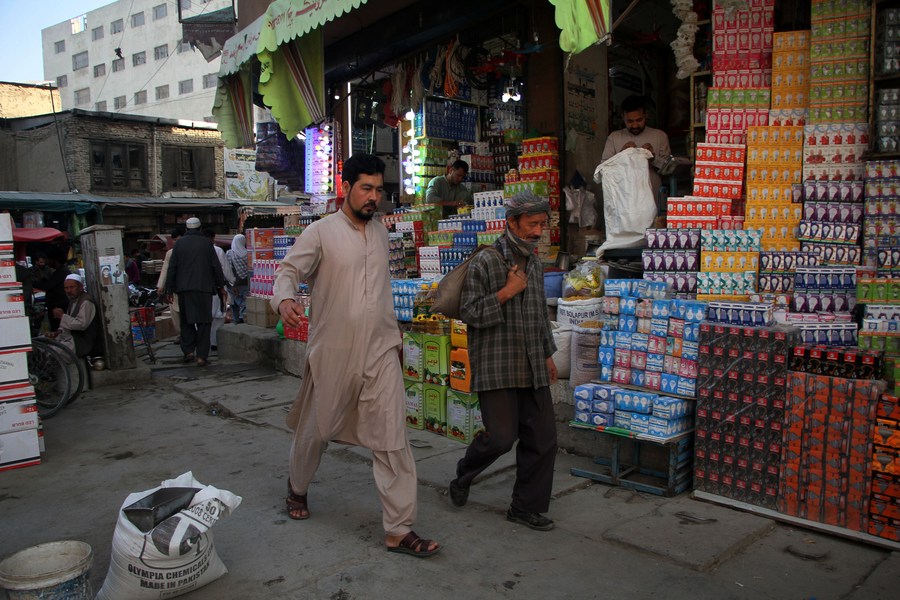Humanitarian crisis from the evasion of responsibility

Afghans walk in a market in Kabul, capital of Afghanistan, Sept. 15, 2021. (Photo by Saifurahman Safi/Xinhua)
Humanitarian crisis in Afghan
More than 3.5 million people are currently displaced from Afghanistan due to the deteriorating security situation in the country, according to the head of United Nations High Commission for Refugees (UNHCR) Filippo Grandi. Significant movements across borders are not yet taking place. UNHCR envisages a worst-case scenario of 500,000 Afghan refugees arriving in neighbouring countries by the end of the year, seeking a total of US$299 million to allow UNHCR, other UN agencies and partners to pre-position aid and to prepare for large outflows of refugees.
The two suicide bombings near Kabul Airport on August 26 killed over 100 Afghans and wounded many others, US forces shot at civilians after the blasts, leading to more casualties, plunging the country into further chaos. On August 29, US forces based in Afghanistan launched drone attacks at a civilian residence on counter-terrorism grounds and left ten civilians dead. The youngest victim was only two years old.
These are not unusual cases of the US killing of innocent people in Afghanistan. In 2002, US Air Force carried out an airstrike on a wedding in Uruzgan province, claimed the lives of more than a dozen civilians and injured over a hundred. In 2008, US troops attacked a village in Herat province, killed nearly a hundred civilians including about 50 children and 19 women. In 2019, a US drone strike mistakenly killed at least 30 Afghan farmers in Nangarhar province. A former US soldier and a drone pilot said in a testimony for a UN expert committee that the drone strikes were purely killing for the sake of killing, and that the US airstrikes led to far more Afghan civilian deaths than the official statistics of the US government. Data shows at least 47,245 Afghan civilians died by April 2020 in the war in Afghanistan launched by the US.
The US leaves Afghanistan in more of a mess than it found it, which has caused a new humanitarian disaster comparable to the tragedy of both Syria and Iraq.
Responsibility shall not be evaded from US withdraw
The US sent troops to Afghanistan in the name of fighting terrorism and spreading democracy 20 years ago. That is for achieving its own strategic goals. 20 years later, the American forces are leaving devastated Afghanistan without taking any responsibility, and for its own benefit again. What the US should not do is to simply take to heels and leave a mess behind. However, the US shirks its responsibility and puts the burden on Afghanistan’s neighbors, asking Pakistan to open its borders and accept more Afghan refugees.
The shambolic exit indicates that the Biden Administration has botched the execution. However, to pass the buck to others is dishonorable, and will be an over-simplification of how things unraveled. In fact, the US and the West have been failing to seriously share the responsibility for protecting the Afghanistan people, let alone those fled their homes in search of safety and security.
According to Amnesty International’s latest reports, there are 22.5 million refugees worldwide, 84% of which are hosted by developing countries. Meanwhile, many wealthy countries continue to prioritize policies that prevent people from seeking asylum and find ways to prevent people from reaching it at all, while placing the burden on neighboring countries to protect those fleeing for their lives.
The human rights of Afghan people should be defended. The US should provide Afghanistan with urgently needed assistance for the economy, livelihood and humanitarian needs, help Afghan people overcome difficulties and embark on the path of peace and reconstruction at an early date.
Withdrawing from Afghanistan though, yet the murder of civilians by the US forces over the past 20 years must be investigated thoroughly and the killers must be brought to justice. At stake is international justice, the rule of law and world human rights development.
Lessons to be learned from failure
As the dust settles, it will take a ruthless assessment of mistakes made and lessons learned. The tumultuous withdrawal is not the end of responsibility, but the beginning of reflection and correction.
The biggest mistake will still have been to neglect lessons learned from history, that wanton military intervention in other countries and the policy of imposing extraneous values and social systems onto other countries will lead nowhere and is doomed to end up in failure.
The past and present of Afghanistan demonstrate that the realization of peace, stability and economic development will be impossible without the establishment of an open and inclusive political structure, implementation of moderate, prudent foreign and domestic policies and a clean break with all terrorist groups.
Another lesson is, countries should truly respect the sovereignty, independence and territorial integrity of Afghanistan, and genuinely respect the rights of the Afghan people to determine their own future, effectively change the wrong practice of imposing models, sanctions or even using force on others.
Plus, on the issue of counter-terrorism, there must not be any double standard or selective approach. The recent terrorist attacks in Kabul once again proved that the war in Afghanistan did not achieve the goal of eliminating terrorist groups in Afghanistan. Countries should follow international law and Security Council resolutions, and resolutely combat international terrorist organizations such as the East Turkestan Islamic Movement (ETIM), the Islamic State and al-Qaeda through cooperation.
A snap shot of America crisis
The US is suffering from a double crisis. Headlines in recent months have focused mainly on America’s crisis of democracy, the deepening polarization and spiraling inequalities in a political environment driven by demographic change, media fragmentation and electoral gerrymandering. But its crisis of global power may turn out to be more consequential in the long run.
Following the Cold War, the US enjoyed a power premium. The world routinely overestimated American interests, and the US enjoyed outsize global influence. But resulting from the Iraq War, the 2008 financial crisis and the Trump presidency, the world no longer places a premium on US power. In Latin America, the US can still fulminate against Venezuela’s government, but to little effect. In Syria, Libya and the disputed region of the South Caucasus, it is Russia and Turkey that are playing an increasingly bigger role.
Regarding the US staunchest ally Europe, a recent pan-European survey by the European Council on Foreign Relations finds that a majority of Europeans have deep doubts about America’s capacity to come back as a global leader. Similarly, a majority fears that the US political system is broken, and at least 60 per cent of respondents in each country surveyed say they can no longer rely on the US to defend them.
The messy withdrawal of US forces from Afghanistan, paired with an apparent lack of consultation among allies before it started, has triggered a ripple effect of concern. A bigger challenge than selling US allies on a China strategy will be to refurbish America’s global image.
Looking back at the chaotic exit from Afghanistan in the future, the symbolism of the American military pullout may increasingly demonstrate as a critical marker of America’s status in a changing world, far eclipsing the flight from Saigon in 1975.
China’s stance
China holds that turbulence and poverty are the root causes of humanitarian crisis. In order to completely address the issue, both the symptoms and the root causes should be addressed and a necessary environment needs to be created to help the refugees get rid of trouble through development and improvement of people's livelihood.
China has been holding humanitarian spirits and providing help within its capacity to refugee-hosting countries under the UN framework. China is willing to, together with the international community, fully drive to cool down the hotspot issues, help refugee-hosting countries improve the ability of dealing with crisis and make efforts to realize the refugee's wish of returning home.
China's position on the Afghan issue is clear and consistent. It hopes Afghanistan can form an open, inclusive and broadly-based government, uphold moderate and prudent domestic and foreign policies, resolutely combat terrorist forces in all forms, co-exist friendly with all countries, and respond to the shared aspiration of the Afghan people and the international community.
China will as always pursue a friendly policy toward the entire Afghan people, respect Afghanistan's sovereignty, independence and territorial integrity and will not interfere in the country's internal affairs.
China believes that a political solution is the only way out for Afghanistan. It stands ready to have dialogue with the US to push for a soft landing of the Afghan issue, so that a new civil war or humanitarian disaster will be prevented in Afghanistan and the country will not relapse into a hotbed and shelter for terrorism. China is willing to coordinate with the US on the premise of mutual respect. However, the US cannot, on the one hand, work hard to contain and suppress China, and on the other hand, counts on China's support. Such logic has never existed in international exchanges.
China will continue to maintain close communication and coordination with all parties in Afghanistan and the international community, combat all terrorist groups including ETIM, provide utmost support and assistance to help Afghanistan restore security, rebuild economy, integrate into the international community for an early realization of peace and reconstruction.
The author is an op-ed contributor to People's Daily and an expert on international studies.
Photos
Related Stories
- Blast rocks Afghanistan's eastern Jalalabad city
- China's HK, Macao affairs office supports release of fact sheet detailing U.S. interference
- World leaders reflect on Afghanistan
- Commentary: US is the biggest threat to world peace
- Full text of fact sheet on U.S. interference in Hong Kong affairs and support for anti-China, destabilizing forces
Copyright © 2021 People's Daily Online. All Rights Reserved.










